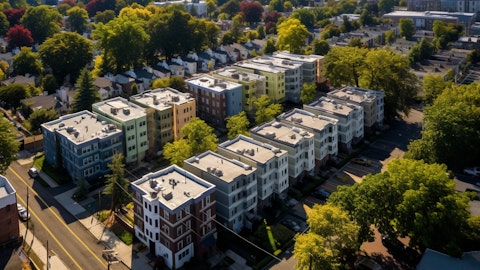This article looks at the 20 least educated states in the US. If interested, you can also view the list of the 50 Most Educated Countries in the World.
Findings by the Bureau of Labor Statistics in 2022 observed a direct relationship between education levels and earnings, with income rising with higher attainment of education. Individuals with less than a high school diploma earned a mere $682 per week, compared to around $1,000 for those with an associate degree. On the other hand, persons holding a bachelor’s degree made $1,432 per week, followed by $1,661 for master’s or postgraduate degree holders, and over $2,000 per week for individuals with professional or doctoral qualifications.
Educational Attainment in the United States
The United States is one of the most educated countries in the world, with 142 campuses ranked among the top 1,000 by QS Rankings, including three of the world’s top five universities being American. These include the Massachusetts Institute of Technology, Harvard University, and Stanford University. According to the US Census Bureau, 37.7% of the country’s population aged 25 and above had a bachelor’s degree or higher in 2022, up from 37.5% in 2020. On the other hand, 28% only had high school as their highest education level. During the 2022-2023 academic year, the US government spent an average of $17,495 per student, according to the National Center for Education Statistics.
Massachusetts is the most educated state in America, with 46.6% of its population aged 25 years and above having at least a bachelor’s degree. Moreover, nearly two-thirds of its youth aged between 18 and 24 have completed some college or associate degree. Some other states widely acclaimed for their education include Vermont, Colorado, New Jersey, and Maryland. Education levels, however, do not remain even across the country, varying by region and even deteriorating in some states, which is the focus of this article.
Making Education More Accessible
Many large corporations in the US actively strive to make education more accessible at a lower cost, both within the country and outside. One of them is Amazon.com, Inc. (NASDAQ:AMZN), which provides a digital platform to several online education companies. In 2019, the company established Project Kuiper, a low Earth orbit (LEO) satellite broadband network, to provide internet connectivity to underserved regions.
The constellation is set to be launched during the fourth quarter of this year, under which Amazon.com, Inc. (NASDAQ:AMZN) will be launching around 3,000 satellites into orbit. The project received the license for deployment from the Federal Communications Commission (FCC) in 2020, and there is great optimism about the project making online education affordable for millions of pupils around the world.
Microsoft Corporation (NASDAQ:MSFT)’s TechSpark program has also been vital in providing residents in rural United States access to digital skills. As a result of this initiative, 88% of the schools in Northeast Wisconsin now offer computer science education, catering to the job market’s needs. Microsoft Corporation (NASDAQ:MSFT) has also launched the Cybersecurity Readiness Program in Mississippi at Jackson State University, which offers cybersecurity experience to students.
The company, under its partnership with Mississippi, has another project in the state, called the CoBuilder Accelerator Program, which brings talented entrepreneurs together from across the state and provides them with necessary training for their ventures. Moreover, Microsoft Corporation (NASDAQ:MSFT)’s Office 365 Education provides free access to students and teachers from various educational institutions to platforms such as Word, Excel, Teams, PowerPoint, and more.

ESB Professional/Shutterstock.com
Methodology
Four weighted metrics were used to rank the least educated states in the US. These included the share of the population aged 25 and above that had a high school education or less as their highest qualification, the percentage of people aged 25 and above that held a bachelor’s degree or higher, the pupil-to-teacher ratio in the state, and expenditure per pupil in the state. The first two metrics were related to the level of education and had a combined weightage of 90%, while the other two were concerning the quality of education in each state and had a weight of 10% in our overall analysis.
Data related to the level of education was sourced from the United States Census Bureau and is for the year 2022. For quality of education, we referred to Insider Monkey’s recent articles on the 20 Worst States for Education in the US and the 20 Best States for Education in the US. We observed where each state ranked on a particular metric and assigned it a weighted score. Finally, all weighted scores were aggregated to get an overall score. The 20 least educated states in the US are listed in descending order of their weighted scores.
At Insider Monkey we are obsessed with the stocks that hedge funds pile into. The reason is simple: our research has shown that we can outperform the market by imitating the top stock picks of the best hedge funds. Our quarterly newsletter’s strategy selects 14 small-cap and large-cap stocks every quarter and has returned 275% since May 2014, beating its benchmark by 150 percentage points. (see more details here).
Let’s now head over to the list of the least educated states in America.
20 Least Educated States in the US:
20. Alaska
Population aged 25 and above with high school or less: 35.7%
Population aged 25 and above with a bachelor’s degree or higher: 30.5%
Pupil-to-Teacher Ratio: 17.9
Expenditure per Pupil: $24,200
Insider Monkey Score: 0.419
Alaska is one of the least educated states in the US, with the seventh worst pupil-to-teacher ratio in the country. Of those who are aged 25 and above, 29.1% have high school graduation as their highest qualification, 2.2% have education less than 9th grade, and 4.4% have studied between grades 9 and 12 without a diploma.
19. Pennsylvania
Population aged 25 and above with high school or less: 40.8%
Population aged 25 and above with a bachelor’s degree or higher: 35.1%
Pupil-to-Teacher Ratio: 13.4
Expenditure per Pupil: $21,924
Insider Monkey Score: 0.418
Over two-fifths of Pennsylvania’s population aged 25 and above have high school or less as their level of education. 15% have completed some college without a degree, while 8.9% have completed an associate degree. Moreover, 11.6% of the youth aged between 18 and 24 in the state have an education level of less than high school.
18. South Carolina
Population aged 25 and above with high school or less: 37.2%
Population aged 25 and above with a bachelor’s degree or higher: 32.6%
Pupil-to-Teacher Ratio: 14.1
Expenditure per Pupil: $16,500
Insider Monkey Score: 0.410
Nearly 3% of South Carolina’s population aged 25 and above is educated less than 9th grade, while 6.7% of them have studied between grades 9th and 12th, but without a diploma. 27.7% of the population in discussion have completed high school graduation. It is among the least educated states in America.
17. South Dakota
Population aged 25 and above with high school or less: 36%
Population aged 25 and above with a bachelor’s degree or higher: 31.6%
Pupil-to-Teacher Ratio: 13.8
Expenditure per Pupil: $13,631
Insider Monkey Score: 0.406
South Dakota was recently listed by Insider Monkey as the 20th worst state for education in the United States, with a pupil-to-teacher ratio of 13.8 and expenditure per pupil measured at $13,631 in 2021 – the 13th lowest in the country. Moreover, 21.7% of the population aged 25 and above have a bachelor’s degree, which falls short of the national average, of 23%, as of 2022.
16. Florida
Population aged 25 and above with high school or less: 37.2%
Population aged 25 and above with a bachelor’s degree or higher: 34.3%
Pupil-to-Teacher Ratio: 17.7
Expenditure per Pupil: $12,713
Insider Monkey Score: 0.396
More than 12% of the youth aged between 18 and 24 and 10.1% of those aged 25 and above in Florida have not completed high school education. It is one of the least educated states in the US. Quality of education in the state is also comparatively on the lower side, with an expenditure per pupil of $12,713 – which is the eighth lowest in the country.
15. Michigan
Population aged 25 and above with high school or less: 36.3%
Population aged 25 and above with a bachelor’s degree or higher: 32.1%
Pupil-to-Teacher Ratio: 16.7
Expenditure per Pupil: $16,740
Insider Monkey Score: 0.384
State expenditure per pupil in Michigan stood at $16,740 in 2021. The state’s pupil-to-teacher ratio is 16.7, which is the 13th highest in the country. Moreover, more than one-third of the population aged 25 and above have a high school diploma or less as their highest education.
14. Texas
Population aged 25 and above with high school or less: 38.1%
Population aged 25 and above with a bachelor’s degree or higher: 33.9%
Pupil-to-Teacher Ratio: 14.6
Expenditure per Pupil: $13,538
Insider Monkey Score: 0.376
Texas is one of the least educated states in the US, with 13.9% of the adults aged 25 and above, and 14.2% of the youth between 18 and 24 years without a high school diploma. The state’s share of bachelor’s (21.6%) and master’s degree (12.3%) holders is also well below the national average in the United States, 23% and 14% respectively.
13. Missouri
Population aged 25 and above with high school or less: 38.6%
Population aged 25 and above with a bachelor’s degree or higher: 32.2%
Pupil-to-Teacher Ratio: 12.8
Expenditure per Pupil: $15,700
Insider Monkey Score: 0.349
Missouri is one of the least educated states in the United States, with only 13% of the population aged between 18 and 24, and just 19.7% of those aged 25 and above having a bachelor’s degree. Attainment of higher education remains a major concern in the state.
12. Ohio
Population aged 25 and above with high school or less: 40.1%
Population aged 25 and above with a bachelor’s degree or higher: 32%
Pupil-to-Teacher Ratio: 16.9
Expenditure per Pupil: $16,879
Insider Monkey Score: 0.296
Ohio’s pupil-to-teacher ratio is the twelfth worst in the United States. Moreover, over two-fifths of its adult population aged 25 and above have a high school degree or less as their highest qualification. Bachelor’s degree attainment is at 19.4%, which is well below the national average of 23%.
11. New Mexico
Population aged 25 and above with high school or less: 37.7%
Population aged 25 and above with a bachelor’s degree or higher: 30.4%
Pupil-to-Teacher Ratio: 14.8
Expenditure per Pupil: $13,377
Insider Monkey Score: 0.280
New Mexico is one of the least educated states in the US, with 5% of the population aged 25 and above having less than a 9th-grade education, 7% studied between 9th and 12th grades but without a diploma, whereas 25.7% have high school as their highest level of education. Moreover, only 16.9% of the people in the age group have a bachelor’s degree and 13.5% have an advanced or postgraduate degree.
10. Tennessee
Population aged 25 and above with high school or less: 40.9%
Population aged 25 and above with a bachelor’s degree or higher: 31.1%
Pupil-to-Teacher Ratio: 15.4
Expenditure per Pupil: $12,466
Insider Monkey Score: 0.228
Tennessee spends an average of $12,466 per pupil, which is the sixth lowest figure in the country. It was recently ranked as the seventh worst state for education in the US by Insider Monkey. Around 10% of the state’s population aged between 18 and 24 years has less than a high school education, while 40.9% of the residents aged 25 and above have high school graduation or less as their highest level of education.
9. Indiana
Population aged 25 and above with high school or less: 41.9%
Population aged 25 and above with a bachelor’s degree or higher: 29.6%
Pupil-to-Teacher Ratio: 15.6
Expenditure per Pupil: $14,654
Insider Monkey Score: 0.173
A mere 19% of Indiana’s population aged 25 and above have a bachelor’s degree, while only 10.6% have an advanced or postgraduate qualification. Both figures are well below the national average. Moreover, 14.5% of the state’s youth aged between 18 and 24 have less than a high school education. It is one of the least educated states in the US.
8. Oklahoma
Population aged 25 and above with high school or less: 41%
Population aged 25 and above with a bachelor’s degree or higher: 28.5%
Pupil-to-Teacher Ratio: 16.2
Expenditure per Pupil: $12,326
Insider Monkey Score: 0.164
Oklahoma has the third lowest expenditure per pupil in the United States, while its pupil-to-teacher ratio ranks the 15th worst in the country. It is one of the least educated states in the US, with a low higher education attainment rate.
7. Nevada
Population aged 25 and above with high school or less: 40.5%
Population aged 25 and above with a bachelor’s degree or higher: 27.1%
Pupil-to-Teacher Ratio: 20.1
Expenditure per Pupil: $12,465
Insider Monkey Score: 0.161
Nevada has the fourth-highest pupil-to-teacher ratio in the US and the fifth-lowest expenditure per pupil. Low attainment of higher education also remains a concern in the state, with only 17.6% of those aged 25 and above having a bachelor’s degree and 9.5% holding a professional or advanced degree.
6. Alabama
Population aged 25 and above with high school or less: 41.6%
Population aged 25 and above with a bachelor’s degree or higher: 28.8%
Pupil-to-Teacher Ratio: 19.3
Expenditure per Pupil: $12,903
Insider Monkey Score: 0.158
Around 12% of Alabama’s population aged between 18 and 24 years has less than a high school education, while only 11% have at least a bachelor’s degree. Educational attainment also remains low for those aged 25 and above, with 11.2% of them not completing their high school diploma.
5. Kentucky
Population aged 25 and above with high school or less: 43.4%
Population aged 25 and above with a bachelor’s degree or higher: 27.9%
Pupil-to-Teacher Ratio: 15.1
Expenditure per Pupil: $15,225
Insider Monkey Score: 0.134
The state of Kentucky is one of the least educated states in America, with 12% of its youth aged between 18 and 24 not completing high school. The state also fares low when it comes to higher education attainment – only 27.9% of the state’s population aged 25 and above have a bachelor’s degree or higher compared to the national average of 37%.




